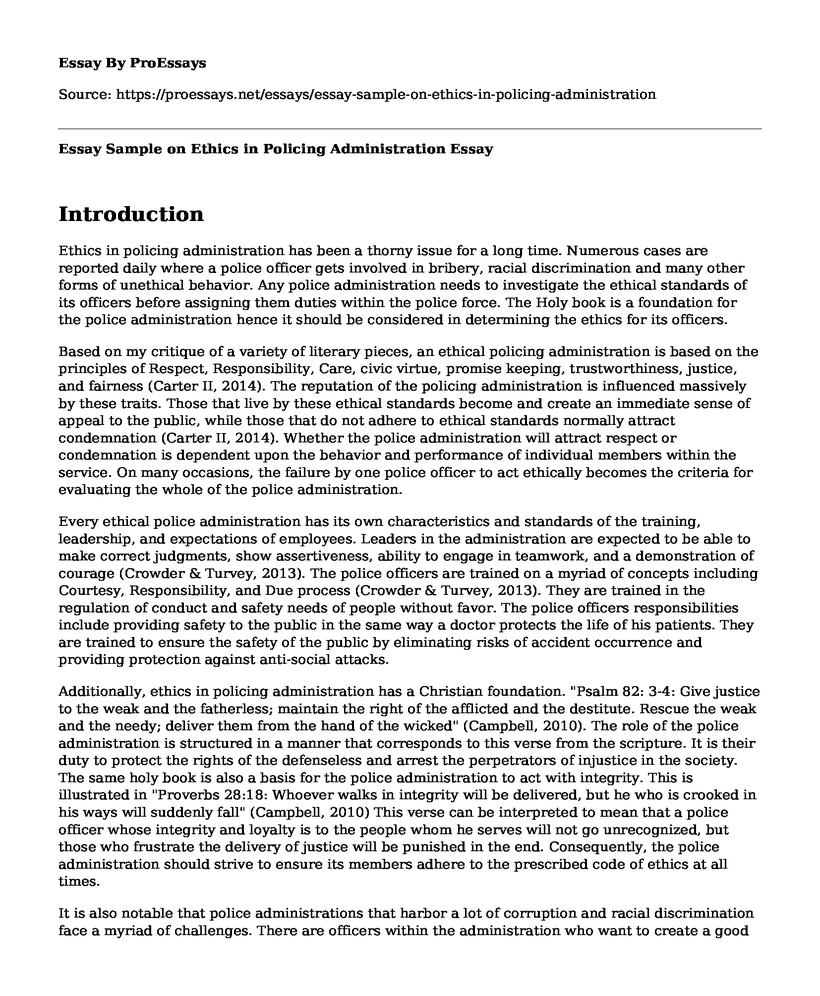Introduction
Ethics in policing administration has been a thorny issue for a long time. Numerous cases are reported daily where a police officer gets involved in bribery, racial discrimination and many other forms of unethical behavior. Any police administration needs to investigate the ethical standards of its officers before assigning them duties within the police force. The Holy book is a foundation for the police administration hence it should be considered in determining the ethics for its officers.
Based on my critique of a variety of literary pieces, an ethical policing administration is based on the principles of Respect, Responsibility, Care, civic virtue, promise keeping, trustworthiness, justice, and fairness (Carter II, 2014). The reputation of the policing administration is influenced massively by these traits. Those that live by these ethical standards become and create an immediate sense of appeal to the public, while those that do not adhere to ethical standards normally attract condemnation (Carter II, 2014). Whether the police administration will attract respect or condemnation is dependent upon the behavior and performance of individual members within the service. On many occasions, the failure by one police officer to act ethically becomes the criteria for evaluating the whole of the police administration.
Every ethical police administration has its own characteristics and standards of the training, leadership, and expectations of employees. Leaders in the administration are expected to be able to make correct judgments, show assertiveness, ability to engage in teamwork, and a demonstration of courage (Crowder & Turvey, 2013). The police officers are trained on a myriad of concepts including Courtesy, Responsibility, and Due process (Crowder & Turvey, 2013). They are trained in the regulation of conduct and safety needs of people without favor. The police officers responsibilities include providing safety to the public in the same way a doctor protects the life of his patients. They are trained to ensure the safety of the public by eliminating risks of accident occurrence and providing protection against anti-social attacks.
Additionally, ethics in policing administration has a Christian foundation. "Psalm 82: 3-4: Give justice to the weak and the fatherless; maintain the right of the afflicted and the destitute. Rescue the weak and the needy; deliver them from the hand of the wicked" (Campbell, 2010). The role of the police administration is structured in a manner that corresponds to this verse from the scripture. It is their duty to protect the rights of the defenseless and arrest the perpetrators of injustice in the society. The same holy book is also a basis for the police administration to act with integrity. This is illustrated in "Proverbs 28:18: Whoever walks in integrity will be delivered, but he who is crooked in his ways will suddenly fall" (Campbell, 2010) This verse can be interpreted to mean that a police officer whose integrity and loyalty is to the people whom he serves will not go unrecognized, but those who frustrate the delivery of justice will be punished in the end. Consequently, the police administration should strive to ensure its members adhere to the prescribed code of ethics at all times.
It is also notable that police administrations that harbor a lot of corruption and racial discrimination face a myriad of challenges. There are officers within the administration who want to create a good name for the police administration. For instance, there have been numerous cases of killings of black people by the police. Such occurrences have greatly trashed the image of the police. The Holy book forbids Christians from killing (Campbell, 2010). Therefore, it does not look good on the police administration for one of them to commit such an act that is not only unethical but against the law. Furthermore, the holy book condemns corruption in "Ephesians 5:11: Take no part in the unfruitful works of darkness, but instead expose them" (Campbell, 2010). It is noteworthy that ethics in the police administration would have higher standards if civilians and police officers join hands to expose cases of corruption within the police department.
Conclusion
Overall, the ethics in the police administration has its foundation in the Holy book. Based on these arguments, an ethical policing administration is trustworthy, keeps promises, provides care, and is responsible. The police are expected to make correct judgments, show assertiveness, and engage in teamwork. After all, lack ethics in the policing administration is a recipe for chaos in any society.
References
Campbell, G. (2010). The Holy Bible. Oxford: Oxford University Press.
Carter II, J. (2014). The Ethics Toolkit: enhancing law enforcement ethics in a community policing environment. Policing: An International Journal of Police Strategies & Management, 33(2).
Crowder, S., & Turvey, B. E. (2013). Ethical Issues in Police Administration. Ethical Justice: Applied Issues for Criminal Justice Students and Professionals, 103.
Cite this page
Essay Sample on Ethics in Policing Administration. (2022, Mar 30). Retrieved from https://proessays.net/essays/essay-sample-on-ethics-in-policing-administration
If you are the original author of this essay and no longer wish to have it published on the ProEssays website, please click below to request its removal:
- Is the Hofstede Framework a Useful Aid in Understanding Cultures and Sub-cultures?
- Support for Bill HB 41 Paper Example
- Implied Powers: Necessary and Proper for Delegated Powers - Essay Sample
- Exploring the Significance of History: How It Shapes Our World - Essay Sample
- Immigration to America in Late 1800s: Reasons & Effects - Essay Sample
- Essay Sample on Young African American Women: Misogyny and Slavery
- Women's History: From Abigail Adams to Hillary Clinton - Essay Example







